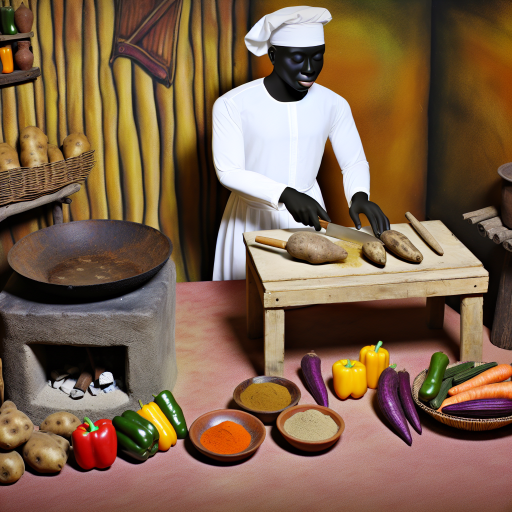Minerals play a crucial role in maintaining overall health and well-being.
Exploring mineral benefits in Nigerian cuisine is important to enhance nutritional value.
This blog post will highlight the mineral-rich ingredients used in traditional Nigerian dishes.
Overview of Common Minerals Found in Nigerian Cuisine
When it comes to Nigerian cuisine, various minerals play a crucial role in maintaining overall health.
These minerals support wellbeing and bodily functions.
Some common minerals in Nigerian foods include iron, calcium, zinc, and magnesium.
Iron Sources in Nigerian Foods
Iron is essential for producing hemoglobin in red blood cells.
It helps transport oxygen throughout the body.
Iron also supports energy production.
Nigerian foods rich in iron include:
- Spinach: A leafy green vegetable commonly used in Nigerian soups and stews.
- Red meat: Beef, goat meat, and chicken are popular sources of iron in Nigerian cuisine.
- Beans: Legumes like black-eyed peas and brown beans are also rich in iron.
Calcium Content in Nigerian Foods
Calcium is necessary for strong bones and teeth.
It also supports muscle function and nerve transmission.
Foods high in calcium in Nigerian cuisine include:
- Egusi soup: Made with ground melon seeds, this traditional soup provides calcium.
- Okra: A nutritious vegetable used in Nigerian cooking that contains calcium.
- Dairy products: Some Nigerian dishes include milk, yogurt, and cheese for added calcium.
Importance of Zinc in Nigerian Cuisine
Zinc is important for immune function and wound healing.
It also supports DNA synthesis.
Unlock the Power of Nigerian Food Minerals
Discover personalized Food Advisory tailored to boost your health or business using expert insights on Nigerian minerals.
Get StartedCommon Nigerian sources of zinc include:
- Oysters: A popular seafood in Nigeria and a great source of zinc.
- Pumpkin seeds: Nuts and seeds like pumpkin seeds are also high in zinc.
- Meat: Beef, chicken, and turkey provide good amounts of zinc in Nigerian cuisine.
Magnesium-Rich Nigerian Foods
Magnesium supports muscle and nerve function.
It also helps regulate blood sugar and promote bone health.
Foods high in magnesium in Nigerian cuisine include:
- Plantains: A staple food in Nigeria and a good source of magnesium.
- Green leafy vegetables: Vegetables like ugu (fluted pumpkin) and bitter leaf are rich in magnesium.
- Nuts: Peanuts, almonds, and cashews help boost magnesium intake.
Incorporating a variety of Nigerian foods rich in these minerals helps maintain optimal health.
Make sure to include diverse foods in your diet to meet daily mineral needs.
The Role of Minerals in Supporting Bodily Functions
Minerals play a crucial role in supporting bodily functions and processes.
These essential nutrients are vital for the proper functioning of our bodies.
Minerals are essential for nerve function.
They support muscle contraction and maintain proper fluid balance.
Minerals also play a key role in energy production and enzyme activity.
For example, calcium is essential for bone health.
Iron is required for oxygen transport in the blood.
Magnesium is involved in over 300 biochemical reactions in the body.
Captivate Your Audience with Exclusive Nigerian Food Content
Imagine your platform enriched with unique, mineral-rich Nigerian cuisine stories that no one else can offer. Let's create content that resonates deeply and sets you apart.
Get StartedThe Importance of Adequate Mineral Intake for Health
Adequate mineral intake is necessary for maintaining overall health and well-being.
Deficiencies in certain minerals can lead to a range of health problems and complications.
For instance, insufficient calcium intake can increase the risk of osteoporosis.
Low iron levels can result in anemia.
It is important to consume a variety of mineral-rich foods to meet daily requirements.
Mineral-Rich Foods and Disease Prevention
Consuming a diet rich in minerals helps prevent various diseases and health conditions.
Minerals play a crucial role in supporting the immune system and protecting the body against illnesses.
Zinc is known for its immune-boosting properties.
Potassium helps regulate blood pressure and reduce the risk of heart disease.
By incorporating mineral-rich foods into your diet, you can reduce the risk of developing chronic diseases.
Supporting Overall Health by Including Minerals in Your Diet
Minerals are essential for maintaining overall health and well-being.
Consuming a variety of mineral-rich foods supports bodily functions.
This practice helps prevent diseases and optimizes your health.
See Related Content: Mineral-Packed Nigerian Recipes for Better Health
Traditional Nigerian Dishes Rich in Minerals
When it comes to Nigerian cuisine, there are several traditional dishes that are not only delicious but also packed with essential minerals.
These dishes are a staple in Nigerian households.
Many enjoy them for their unique flavors and nutrient-rich ingredients.
Egusi Soup
One of the most popular Nigerian dishes known for its mineral content is Egusi Soup.
This dish is made from melon seeds.
Melon seeds are high in iron, magnesium, and zinc.
The soup typically contains leafy greens such as spinach or bitter leaf.
These greens are rich in vitamins and minerals.
To prepare Egusi Soup, start by blending melon seeds with water to create a thick paste.
In a pot, heat palm oil and add onions, peppers, and other seasonings.
Then, add the melon seed paste and cook until thickened.
Finally, add your choice of protein such as meat or fish, along with the leafy greens.
Serve hot with fufu or rice.
Bitter Leaf Soup
Bitter Leaf Soup, also known as Ofe Onugbu, is another traditional Nigerian dish that is packed with minerals.
Bitter leaf is rich in calcium, potassium, and vitamin C.
This makes it a nutritious addition to any diet.
To make Bitter Leaf Soup, start by washing the bitter leaf to remove the bitterness.
In a pot, combine palm oil, onions, peppers, and locust beans.
Add your choice of protein such as beef or stockfish, along with crayfish and other seasonings.
Finally, add the bitter leaf and cook until the flavors are well combined.
Serve hot with your favorite side dish.
Okra Soup
Okra Soup, also known as Okra Stew or Ila Asepo, is a popular Nigerian dish.
This dish is not only delicious but also rich in minerals.
Okra is high in magnesium, folate, and fiber.
This makes it a healthy choice for those looking to boost their nutrient intake.
To make Okra Soup, start by chopping okra into slices and boiling until tender.
In a separate pot, heat palm oil and add onions, peppers, and other seasonings.
Then, add your choice of protein such as shrimp or fish, along with the cooked okra.
Cook until the soup thickens.
Serve hot with eba or pounded yam.
These traditional Nigerian dishes are not only flavorful and satisfying.
They provide a wealth of essential minerals to support overall health and well-being.
Give these recipes a try at home and experience the benefits of mineral-rich Nigerian cuisine.
Find Out More: Traditional Nigerian Foods to Boost Your Mineral Health
Exploring Mineral Benefits in Nigerian Cuisine
The impact of mineral deficiency in Nigerian diets
- Mineral deficiencies are prevalent in Nigeria due to poor dietary choices.
- Inadequate mineral intake can lead to various health consequences.
- To prevent deficiency, include mineral-rich foods like leafy greens, nuts, and beans.
- Proper cooking methods can also help preserve minerals in Nigerian dishes.
- Being mindful of portion sizes and nutrient balance is crucial for optimal health.
- Seek professional advice or consider supplements if you suspect a deficiency.
- Addressing mineral deficiencies through diet can improve overall well-being.
Explore Further: Nutrient-Packed Nigerian Recipes for Mineral Intake

Cultural significance of mineral-rich foods in Nigerian cuisine
Exploring the cultural importance of certain mineral-rich foods in Nigerian cuisine reveals deep-rooted traditions.
These ingredients carry beliefs that have been passed down across generations in Nigeria.
Traditional preparation methods emphasize preserving nutrients in Nigerian dishes.
These methods also enhance flavors, reflecting the value placed on food quality.
Communities throughout Nigeria uniquely incorporate mineral-rich foods into their culinary practices.
This diversity showcases various flavors and cooking techniques across regions.
- Exploring the cultural importance of certain mineral-rich foods in Nigerian cuisine reveals deep-rooted traditions and beliefs associated with these ingredients.
- Traditional preparation methods highlight the value placed on preserving nutrients and enhancing flavors in Nigerian dishes.
- Communities across Nigeria have unique ways of incorporating mineral-rich foods into their culinary practices, showcasing the diversity of flavors and techniques.
Uncover the Details: Enhancing Health with Nigerian Mineral-Rich Foods
When it comes to incorporating more mineral-rich foods into your diet, there are several practical tips that can help you increase your mineral intake through Nigerian cuisine.
Choose Nutrient-Dense Foods
Opt for traditional Nigerian ingredients like vegetables, beans, fish, and lean meats.
These foods are packed with essential minerals.
Include a Variety of Foods
Rotate different types of Nigerian dishes to ensure you are getting a wide range of minerals.
This helps you obtain minerals from various food sources.
Cook with Less Oil
Reduce the amount of oil used in cooking to avoid excessive calories.
Focus more on the nutritional value of the ingredients instead.
Incorporate Leafy Greens
Leafy greens such as spinach, ugu, and bitter leaf are rich in minerals like iron, calcium, and magnesium.
Include them in soups, stews, and salads.
Include Whole Grains
Swap refined grains for whole grains like brown rice, millet, and fonio.
These grains provide minerals such as zinc, magnesium, and selenium.
Integrate Legumes
Legumes like beans, lentils, and cowpeas are high in minerals like potassium, iron, and zinc.
Include them in dishes such as bean porridge, moi moi, and akara.
Snack on Nuts and Seeds
Snack on peanuts, cashews, pumpkin seeds, and sesame seeds.
These are excellent sources of minerals like copper, manganese, and phosphorus.
Enjoy Mineral-Rich Beverages
Enjoy traditional Nigerian beverages like kunu, zobo, and tiger nut milk.
They provide essential minerals such as calcium, potassium, and magnesium.
Enhance Flavor with Nutrient-Rich Herbs and Spices
Enhance your dishes with herbs and spices like curry leaves, scent leaves, utazi, and uziza.
These boost your mineral intake effectively.
By incorporating these tips into your daily meals, you can easily increase your mineral consumption through traditional Nigerian cuisine.
You will also maintain a balanced diet.
Health Benefits of Mineral-Rich Nigerian Cuisine
Exploring mineral benefits in Nigerian cuisine is crucial for overall health and well-being.
Readers are encouraged to experiment with mineral-rich Nigerian dishes for a balanced diet.
Minerals play a vital role in supporting various bodily functions and promoting optimal health.
By incorporating mineral-rich ingredients like leafy greens, beans, and seafood into your meals, you can improve your overall well-being.
Do not underestimate the power of minerals in enhancing your health and vitality.
Make Nigerian cuisine a part of your regular diet!
Additional Resources
Top 14 West African Foods for Gut Health and Digestive Wellness …
The ‘Nigerian Diet’ and Its Evolution: Review of the Existing …




